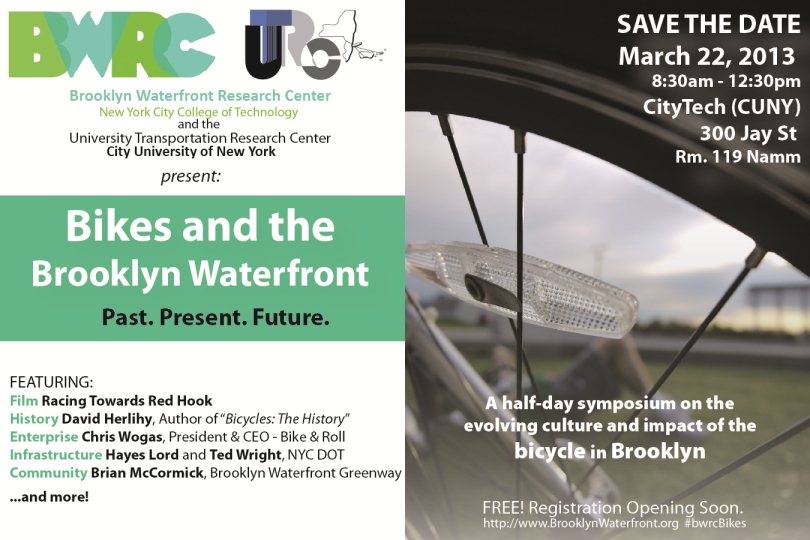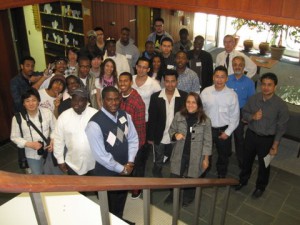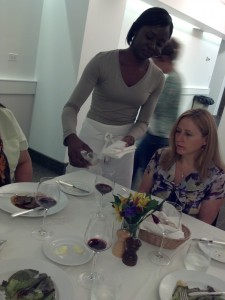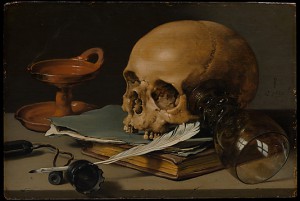On Friday March 22, the Brooklyn Waterfront Research Center will host a half-day conference on the history, culture, and future of biking in our namesake borough. The conference will bring together local authors, business people, planners and advocates in a conversation about what is happening on our streets and why it matters to Brooklyn and New York City. Hope to see you there!
Category Archives: Place-based Learning
Viviana Vladutescu: Making Sense of Remote Sensing
For students in Professor Viviana Vladutescu’s EET 3132 Remote Sensing class, a visit to a “real” lab vividly brought together theory and practice. In the classroom and university labs, students learned the principles of remote sensing techniques, acquired new software knowledge, and gathered and interpreted data as well. As part of their coursework, Professor Vladutescu’s students participated in a departmental field trip to the impressive Brookhaven National Laboratory on Long Island. With the objective of expanding awareness of the field and encouraging further study in the applied sciences, engineering, and physics, students had the opportunity to observe firsthand the work of technicians, engineers, and scientists. One student noted how unexpected it was to hear a Brookhaven physicist cite the “right hand rule method” that was taught in class, a technique that the student thought was used to “dumb down” content in class when in reality it was a practical trick of the trade.
Students in Professor Vladutescu’s course are enrolled in the Associate or Bachelor degree programs in the Department of Electrical and Telecommunications Engineering Technology (ETET). For many, meeting active professionals helped validate their own academic choices in the ETET programs. Several students were inspired when they learned that some of the Brookhaven lab technicians graduated with associate degrees too, thus giving them a better sense of the end goals of graduating with a degree from City Tech. To encourage students to be proactive in their academic and professional careers, Professor Vladutescu’s class website on the OpenLab included links to internships and job opportunities as well as newsfeeds to stay up-to-date on current technology.
Click here for reflections on one of Professor Vladutescu’s field trips.
The President’s Taste Test: Wine Making in Karen Goodlad’s Class
In honor of Presidents’ Day, it is fitting to showcase a class lesson conducted by Professor Karen Goodlad and Prof. Lynda Dias as guest lecturer’s in Prof. Roger Dagorn’s class, HGMT 4997 Wines of the New World, which ended in a wine presentation to City Tech President Russell Hotzler in the University’s Janet Lefler Dining Room. Students worked in groups to produce new blends and evaluated and voted on which wines to serve in City Tech’s dining room, a veritable lab for students in the Hospitality program. Student teams created blends called “Spicy Brooklyn” or “Charlie’s Angels” by striking a tasty balance of reds such as Cabernet Sauvignon, Cabernet Franc, Merlot, and Petit Syrah. The teams blogged about their experience and various blend formulations on the class website.
This course examines the multi-faceted world of wine, from production to service to economic regulations of wine industries in North America, Australia, New Zealand, Chile, Argentina, and South Africa. Class trips included a memorable one to the local City Winery in Lower Manhattan. In turn, experts from the industry visited the classroom on City Tech campus.
Click here for more photos of Professor Goodlad’s blending lesson.
Mary Sue Donsky: Sketching for the Study of Estates, Wills, and Trusts
Professor Mary Sue Donsky schedules field trips to art museums for students in her LAW 2301 Estates, Wills, and Trusts course. On one recent trip to the Metropolitan Museum of Art, she gave students a tour “Honoring Decedents in Art Across Time and Cultures” that used artifacts from the museum’s collection to highlight funerary-related traditions through history. What’s a decedent? For those unfamiliar with legal lingo, a decedent is a deceased person, a term used mainly in law. During the field trip students were asked to sketch art that honors decedents such as grave markers or ancestor figures, or other examples of related artifacts, including sarcophagi, urns, and reliquaries. Following the trip, students visited museum websites all over the world to “collect” objects for a class blog. Professor Donsky effectively uses the skill of drawing to communicate the historical dimensions of the course. Giving students the opportunity to sketch is a unique way to reinforce and broaden lessons learned in the class room, and suggests that perhaps we should consider drawing to be a Gen Ed skill.
Alex Aptekar: Student Projects in Building Technology
 Professor Alexander Aptekar offers two advanced-level courses in Building Technology for the Department of Architectural Technology. Both courses share one class website that is filled with readings, instructions, and video tutorials. Since assignments for both courses are posted, students can see what is expected of them in the following sequence of the course. Assignments range from early ‘scavenger hunt’ type exercises to more complex projects late in the semester. Moreover, the class website offers the opportunity for students to showcase their work. For example, see a student’s project for an assignment that evaluated the student’s understanding a structure grid, levels, and framing plan.
Professor Alexander Aptekar offers two advanced-level courses in Building Technology for the Department of Architectural Technology. Both courses share one class website that is filled with readings, instructions, and video tutorials. Since assignments for both courses are posted, students can see what is expected of them in the following sequence of the course. Assignments range from early ‘scavenger hunt’ type exercises to more complex projects late in the semester. Moreover, the class website offers the opportunity for students to showcase their work. For example, see a student’s project for an assignment that evaluated the student’s understanding a structure grid, levels, and framing plan.







